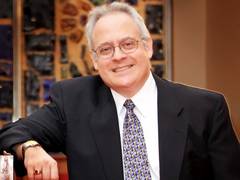Rabbi Mark's Commentary
Lech-Lecha Mini-Drash
This parsha, which describes our first meeting with Abraham and Sarah on their travels, includes their visit to Egypt, meant as a foreshadowing of the Israelite sojourn in Egypt many years later.
The text tells us that Sarah’s immense beauty captures the Pharaoh’s heart and he takes her into his harem. This raises the question of adultery. No one wants to accuse our ancestor Abraham of foisting his wife on an unknowing Pharaoh. For me, the best explanation for Abraham’s action is that of Sondra Henry and Emily Taitz, co-authors of Our Forgotten Foremothers. They make a strong case for Abraham and Sarah’s marriage under Hurrian law—when the couple departed their homeland, they were leaving Haran—and how it could explain why Abraham’s allowing Pharaoh to take Sarah into his harem was not a crime.
In Hurrian law, Abraham “adopted” Sarah, so she was not just his wife, but rather enjoyed the higher status of being a sort of sister to Abraham. This explanation may confuse us moderns, but it does explain why his consigning his wife (sorry: sister) to the Egyptian monarch was not violating any Hebrew or Egyptian law. You may not agree with this, but it goes a long way to explaining why Abraham’s subterfuge was acceptable to his God.
Furthermore, Pharaoh’s role in this story—that of the absolute monarch who could easily have murdered Abraham and taken his wife away anyway—gives a stronger defense to Abraham’s subterfuge. Throughout Jewish history, we have often had to tread delicately amid our enemies in order to survive, which is why there is a rabbinic saying, “It is better to be a living dog than a dead lion.”
All Services and Minyan are hybrid, Zoom & Live
MORNING MINYAN, SHABBAT SERVICES:
Select to view the scheduled services, classes, lectures, and, events.
MEET OUR RABBI
OUR RABBI - David Hartley Mark
WATCH RABBI MARK , To Life, L'Chaim #217 - Rabbi David Mark (You Tube)
Rabbi David Hartley Mark was born in New York City, and grew up on the Lower East Side, that legendary Jewish immigrant neighborhood, attending Hebrew Day School. He was first from his school, the East Side Torah Center, to attend Yeshiva University High School for Boys—Manhattan. David attended Yeshiva University, where he attained a BA in English Literature, a BS in Bible and Jewish Education, and a Hebrew Teacher’s Diploma (HTD). He spent his third year of college at Bar Ilan University in Ramat-Gan, Israel, where he developed a fluency in Hebrew, and toured around the country. He has also attained a Certificate in Advanced Jewish School Administration from the Hebrew College in Brookline, MA.
David attended the City University of New York Graduate Center, where he earned an MA degree from Queens College, as well as an M.Phil. degree, majoring in 17th Century English, specializing in the work of John Milton, as well as the Romantic Poets. A year teaching Hebrew School in a Reform temple in Brooklyn convinced him of his great love of Judaism, and he began attending the Academy for Jewish Religion, Yonkers, NY, where he was ordained a rabbi in 1980.
He met Anbeth, who was hired as temple secretary the same day he was hired to teach. They were married in 1978. They have two grown children, Tyler and Jordan, as well as a grandson, Aidan.
Rabbi Mark served pulpits in Warren, NJ, Fayetteville, NC, and Portsmouth, NH, in which last pulpit he spent 22 years, a record for that state. Seeking warmer climes, as well as closer family members, he and Anbeth took the pulpit of Temple Sholom in 2009. He also fulfilled a lifetime dream of teaching English at Keiser University in Ft. Lauderdale.
WORSHIP WITH US
Your connection to the Jewish faith
is a vital part of who you are, and your family.
At Temple Sholom, congregants join together to celebrate our faith in a warm, comfortable and supportive environment, where all are welcome.
We are a modern, egalitarian congregation, and encourage full participation by women in synagogue life, as well as offer full access to Jewish worship and religious experience for all of our members. At the same time, we cherish our Jewish traditions, and work to preserve them as a precious legacy for ourselves and our children.
Visit us and let us make you feel at home.
Our Czech Torah - Holocaust Memorial Scroll
The Torah was shipped in 1989 following a request from Malcolm Black who was the President at that time. The Torah is about 200 years old and comes from Mlada Boleslav, a town in the Czech Republic.

Thu, October 30 2025
8 Cheshvan 5786
Today's Calendar
| Morning MINYAN Zoom ID: 838 9211 3316 : 8:45am |
| Play Mahjongg live in the Temple : 11:00am |
This week's Torah portion is Parshat Lech Lecha
| Shabbat, Nov 1 |
Candle Lighting
| Friday, Oct 31, 6:21pm |
Shabbat Mevarchim
| Shabbat, Nov 15 |
Update this content.
Update this content.
Zmanim
| Alot Hashachar | 6:19am |
| Earliest Tallit | 6:45am |
| Netz (Sunrise) | 7:28am |
| Latest Shema | 10:15am |
| Zman Tefillah | 11:12am |
| Chatzot (Midday) | 1:04pm |
| Mincha Gedola | 1:32pm |
| Mincha Ketana | 4:20pm |
| Plag HaMincha | 5:30pm |
| Shkiah (Sunset) | 6:40pm |
| Tzeit Hakochavim | 7:15pm |
| More >> | |
Join Our Mailing List
Temple Sholom
132 SE 11th Ave
Pompano Beach, Fl 33060
(954) 942-6410
Privacy Settings | Privacy Policy | Member Terms
©2025 All rights reserved. Find out more about ShulCloud



